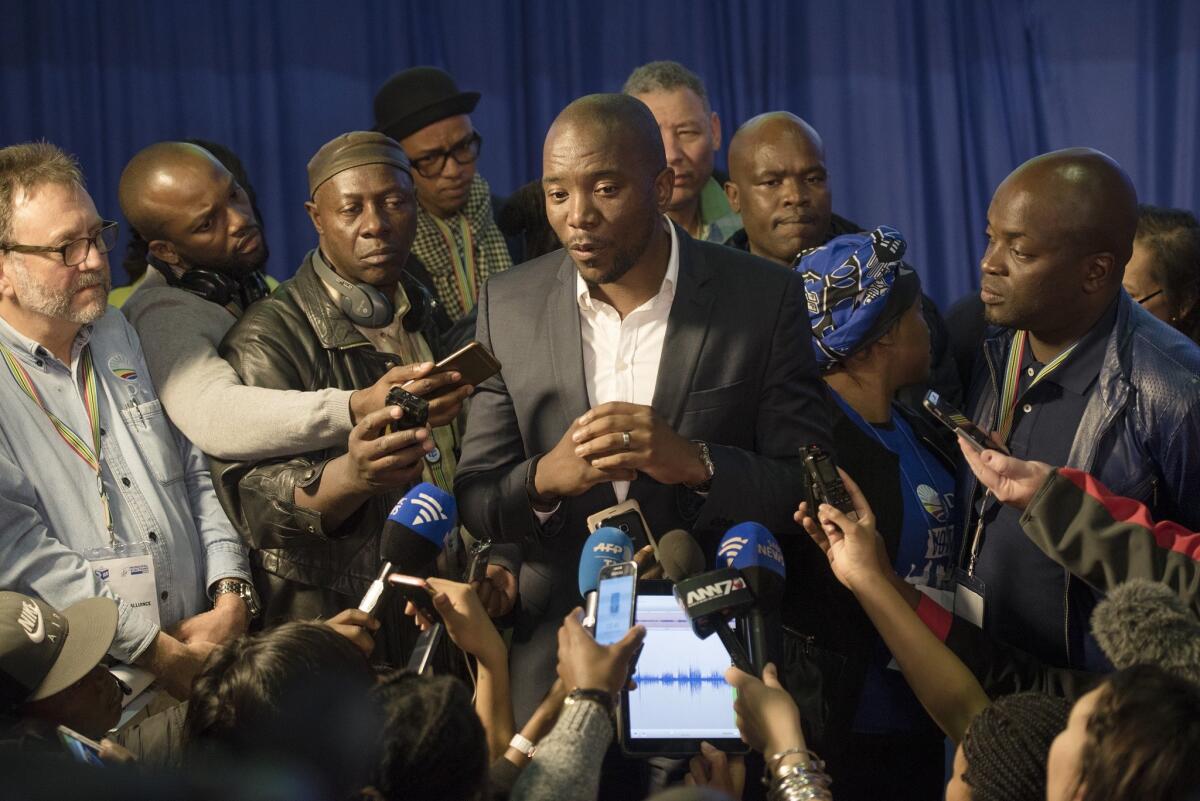South Africa’s ruling party suffers biggest election setback since apartheid

- Share via
Reporting from Johannesburg, South Africa — The party of Nelson Mandela, South Africa’s governing African National Congress, faced its biggest election blow since the end of apartheid Saturday, as many voters in municipal elections either didn’t vote, or favored two black-led opposition parties.
The ANC’s support remains substantial, at around 54% of the vote 22 years after the first democratic election. But it lost out to the main opposition party, the Democratic Alliance, in two major cities – Tshwane, where the seat of government, Pretoria, is located, and Nelson Mandela Bay on the south coast, where a white mayor, Athol Trollip, will govern for the DA.
The 54% tally was a major psychological blow for a party whose vote has never fallen below 60% in previous elections.
Results for the most populous city, Johannesburg, were still being counted, but the ANC was well ahead with 44% of the vote compared with 38.7% for the Democratic Alliance.
In a sign of the ANC’s shock at the losses, the governing party canceled its victory party at its election headquarters in Johannesburg on Saturday, according to local media.
The result puts the spotlight on South African President Jacob Zuma, who has been criticized for passing off personal upgrades to his home as security expenses.
See the most-read stories this hour »
But political analyst Justice Malala, predicted Saturday that Zuma would not be ousted before his term expires, noting that he controls 60% of the ANC’s national executive committee, the only body that has the power to remove him.
The ANC’s support in most rural areas held up and its support in Zuma’s stronghold of KwaZulu-Natal increased. But its losses in urban areas may signal that the ANC’s hold over middle-class black voters and poor blacks in sprawling urban townships may be waning.
More than two decades after the end of apartheid, growth is sluggish, and unemployment remains stubbornly high at nearly 27%, excluding those who have given up looking for work.
Senior ANC figures said the government would go back to its base to find out why people turned away from the party.
“Once we go back‚ they will say‚ ‘Well guys‚ we did not vote for you because we are not happy about this,’ and we will see how we change those things. That is what democracy is all about,” said Paul Mashatile, chairman of the ANC in Gauteng, the most populous state, speaking at the tally center of the Independent Electoral Commission.
The Democratic Alliance was white-led until last year, a barrier to its performance in elections, but a young black leader, Mmusi Maimane, 36, took over last year after the resignation of Helen Zille. Under Zille, the party consolidated and won control of Cape Town, the country’s second biggest city.
The alliance won nearly 27% of the vote nationally in the current municipal vote, while the radical left party, the Economic Freedom Fighter, led by Julius Malema, gained just over 8%, according to results announced Saturday by the Independent Electoral Commission.
The Tshwane result leaves Malema as the potential kingmaker, with the Democratic Alliance forced to seek out coalition partners after falling short of the majority required to rule in its own right. In Tshwane, the alliance won 43% of the votes to the ANC’s 41% with the EFF gaining 12% of the vote.
Malema, who has called for nationalization of banks and government seizures of white farmland, has given conflicting signals on whether he would be willing to form a coalition with the DA or the ANC.
The DA’s victory in Nelson Mandela Bay gives the party the opportunity to prove its efficiency as a government in that region, something it has tried to do in Cape Town.
During the election campaign, Maimane angered the ANC by trying to claim Mandela’s mantle, saying the DA was the “only party that is carrying forward the vision and the values of Nelson Mandela.”
Maimane addressed a mass rally in Port Elizabeth, the main city in the municipality.
He said the result had shattered the idea that the DA was a white party.
Voter turnout was up slightly from the previous municipal election in 2011 at 58%.
MORE FROM WORLD
Olympics security: What Brazil had to learn about terrorism
Ukrainian separatist leader wounded in car bombing
UPDATES:
12:30 p.m.: This article was updated throughout with staff reporting.
This article was originally published at 9:35 a.m.
More to Read
Sign up for Essential California
The most important California stories and recommendations in your inbox every morning.
You may occasionally receive promotional content from the Los Angeles Times.










